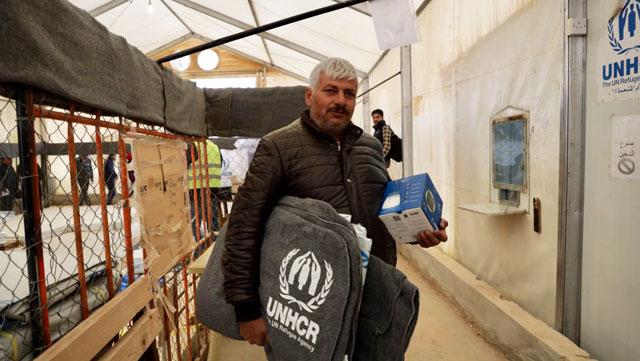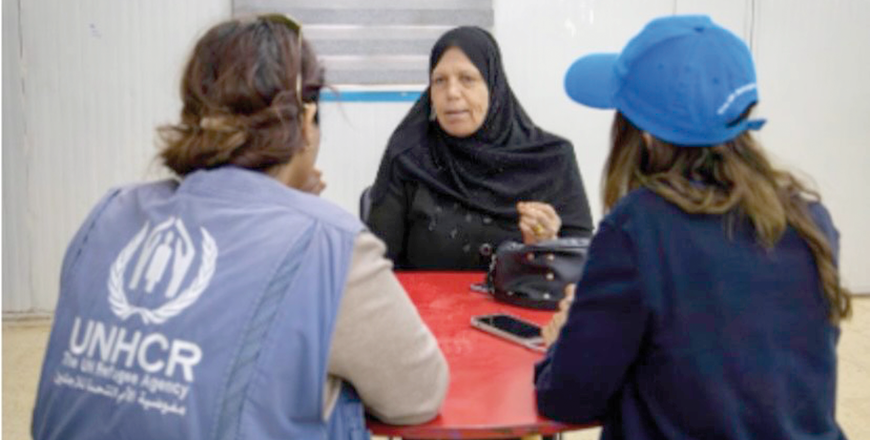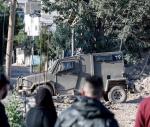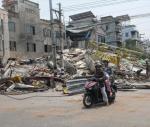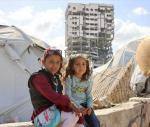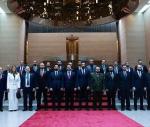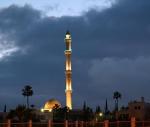You are here
Role of technology in lives of Iraqi refugees ‘significant’
By Saeb Rawashdeh - Dec 15,2018 - Last updated at Dec 15,2018
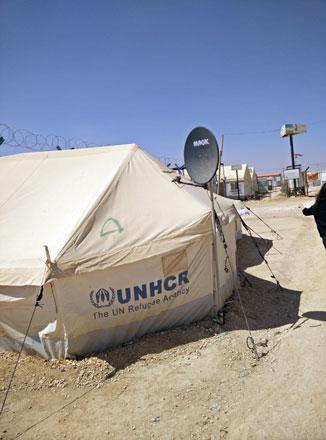
In this undated photo, a satellite dish stands outside a UNHCR tent. Mirjam Twigt recently released findings detailing the role of technology in the lives of Iraqi refugees (Photo courtesy of Mirjam Twigt)
AMMAN — Technology plays a significant role in connecting Iraqi refugees living in Jordan, and particularly in Amman, a Dutch anthropologist recently said.
According to the anthropologist whose talk, “The connected forced migrant”, was organised on December 9 at the CBRL British Institute in Amman, technology plays a key role in connecting migrants in Jordan with people who have stayed behind in Iraq.
Mirjam Twigt studied the lives of Iraqi refugees in urban households between January and September of 2015, when according to the UNHCR in Jordan, 50,856 of them resided in the Kingdom.
“As most of you know, more than 80 per cent of people registered with UNHCR Jordan live in urban areas,” noted the anthropologist, who obtained her PhD at the University of Leicester.
Camp and camp-like circumstances are certainly not devoid of normal practices, as many of those in the study connected to satellite TV and the Internet through their smartphones. However, issues such as the lack of electricity and limited access to Internet connections tend to diminish access to such things, she underlined.
“Some of the registered Iraqi nationals had been living in Jordan for years as they sought refuge from the conflict that erupted after the US invasion in 2003. Others came to Jordan more recently, as they fled from the atrocities of Daesh,” she explained.
The scholar did not focus on the upper and middle class Iraqis in Jordan, but on those less fortunate and registered with the UNHCR.
The “less well-off Iraqis and/or those who have run out savings, have regrouped in east Amman”, she said, adding that despite “sometimes apparent financial struggles, in all Iraqi households there was a widespread availability of smartphones and an ever-present flickering TV-screen”.
For Iraqi refugees, the right to work and opportunities to obtain Jordanian citizenship, or other paths to building a future in Jordan continue to be restricted, especially for those who do not have access to finances, the anthropologist said.
“In 11 of the 35 households I interviewed, there was at least one person in the household who was working informally at that time. Others were depending on aid, savings or financial help from relatives,” she added
Most of their time would be spent at home and “men would often emphasise how life in Jordan consisted of boredom, frustration and despair: No longer being able to provide for their families, they felt stuck in what they associated as female domesticity”, Twigt said, adding that the older men acted as “dictatori” (dictators), and the person in charge of the remote control.
"For Iraqi women, life was certainly not devoid of mediated practices. In fact, for them and their children, smartphones were crucial to carve out a private sense of place — often through mediated interactions on public platforms — within the confines of their temporary homes," she said.
“Not all forced migrants have equal access to digital technologies,” she said, “and differences in access and availability to technologies are persisting”.
She added that it is safe to say that digital connectivity has at least partly become embedded in the everyday experiences and sense-making processes of most conflict-affected migrants worldwide. Part of this is because migrants often have to navigate new surroundings and legal and social uncertainties, and their social relations tend to be disrupted by war and borders.
Recognising the importance of technology in forced migrants’ lives also means realising the risks as "modern means of communication could be easily [mis]used for exerting control and for pushing a neoliberal agenda”, Twigt said, adding that to do so could, “aggravate already unequal power relations between humanitarian agencies and refugees".
Related Articles
AMMAN — UNHCR, the UN Refugee Agency, has received no funding for the 2022 winter assistance programme.
AMMAN — As of January 17, the United Nations High Commissioner for Refugees (UNHCR) had covered $40.84 million, or 11 per cent, of Jordan’s
AMMAN — June’s Jordan funding update issued by UNHCR, the UN Refugee Agency, shows that the agency has obtained 31 per cent of its $39


